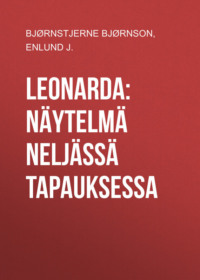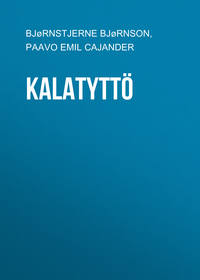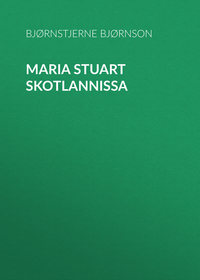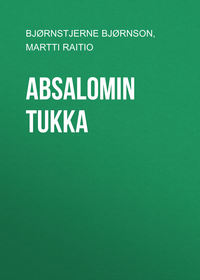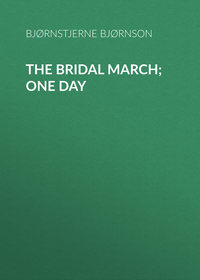 полная версия
полная версияMagnhild; Dust
"Why are you staring at me?" asked he, with his most comical grimace. Magnhild turned with a searching glance toward the window.
The room had become filled at once with the peculiar saddler odor which attended Skarlie: Magnhild was about to open the window, but thinking better of it stepped back again.
"Where is your lodger?"
"He is across the street."
"Are there lodgers there, too?"
"Yes, a Fru Bang with her daughter."
"So they are the people you associate with?"
"Yes!"
He rose, took off his coat, and also laid aside his vest and cravat. Then he filled his cutty with tobacco, lighted it, and sat down again, this time with an elbow resting on one arm of the chair and smoking. With a roguish smile he contemplated his other half.
"And so you are going to be a lady, Magnhild?"
She did not answer.
"Aye! – Well, I suppose I shall have to begin to make a gentleman of myself."
She turned toward him with an amused countenance. His chest, thickly covered with dark red hair, was bare, for his shirt was open; his face was sunburned, his bald head white.
"The deuce! how you stare at me! I am not nearly as good-looking as your lodger, I can well believe. Hey?"
"Will you have something to eat?" asked she.
"I dined on the steamer."
"But to drink?"
She went out after a bottle of beer, and placed it with a glass on the table beside him. He poured out the beer and drank, looking across the street as he did so.
"That's a deuce of a woman! Is that the lady?"
Magnhild grew fiery red; for she too saw Fru Bang standing at the window, staring at the half-disrobed Skarlie.
She fled into her chamber, thence into the garden, and there seated herself.
She had only been there a few minutes when she heard first the chamber, then the kitchen door open, and finally the garden door was opened by her husband.
"Magnhild!" he called. "Yes, there she is."
Little Magda's light curly head was now thrust out, and turned round on every side until Magnhild was seen, and then the child came slowly toward her. Skarlie had gone back into the house.
"I was sent to ask if you were not coming over to take dinner with us."
"Give greetings and thanks; I cannot come – now."
The child bestowed on her a mute look of inquiry, then asked: "Why can you not? Is it because that man has come?"
"Yes."
"Who is he?"
It was in Magnhild's mind to say, "He is my – "; but it would not cross her lips; and so without speaking she turned to conceal her emotion from the child. The little one stood silently waiting for some time; finally she asked, —
"Why are you crying, Magnhild?"
This was said so sweetly: it chimed in with the memory of the whole bright world which was once more closed, that Magnhild clasped its little representative in her arms, and bowing over the curly head burst into tears. Finally, she whispered, —
"Do not question me any more, little Magda; but go home now, this way, through the garden gate, and tell mamma that I cannot come any more."
Magda obeyed, but she looked over her shoulder several times as she walked away.
Magnhild removed all traces of tears, and went out to make some purchases; for her larder was nearly empty.
When she returned home, and passed through the sitting-room, Skarlie was still in his chair; he had been taking a little nap; now he yawned and began to fill his cutty.
"Did you tell me the lady across the street was married?"
"Yes."
"Is he married, too?"
"I do not know."
"I saw them kissing each other," said he.
Magnhild grew very pale and then red.
"I have never seen anything of the kind."
"No, of course not; they did not suppose that I saw them either," said he, and began to light his cutty.
Magnhild could have struck him. She went directly to the kitchen, but could not avoid coming back again. Skarlie greeted her with, —
"It is no wonder they make much of you, for you serve as a screen."
She had brought in a cloth to spread the table, and she flung it right at his laughing face. He caught it, however, and laughed all the louder, until the tears started in his eyes; he could not restrain his laughter.
Magnhild had run back into the kitchen, and she stood in front of the butter, cheese, and milk she had ready to carry into the adjoining room, – stood there and wept.
The door opened, and Skarlie came limping in.
"I have spread the cloth," said he, not yet free from laughter, "for that, I presume, was what you wanted: eh?" and now he took up one by one the articles that stood before Magnhild, and carried them into the next room. He asked good-naturedly after something that was wanting, and actually received an answer. After a while Magnhild had so far recovered her composure as to set the kettle on the fire for tea.
Half an hour later the two sat opposite each other at their early evening meal. Not a word more about those across the street. Skarlie commenced telling of his work on the steamer, but broke off abruptly, for Tande began to play. Skarlie had taste for music. It was a restless, almost defiant strain that was heard; but how it brightened the atmosphere. And it ended with the little melody that always transported Magnhild to the home of her parents, with the fair heads of her little brothers and sisters round about. Skarlie evidently listened with pleasure, and when the playing ceased, he praised it in extravagant terms. Then Magnhild told him that she was singing with Tande; that he thought she had a good voice. She did not get beyond this; for the playing began anew. When it had ceased again, Skarlie said, —
"See here, Magnhild! Let that man give you all the instruction he will; for he is a master – and with the rest you need not meddle."
Skarlie was still in extraordinarily high spirits when, weary from his journey, he went up to the room over the saddler workshop to go to bed. He filled his pipe, and took an English book and a light up-stairs with him.
Magnhild thoroughly aired the room after him, opening all the windows as soon as he was gone. She paced the room in the dark for a long while ere she laid herself down to sleep.
The next morning she stole out of the back door to school, and returned the same way.
She found the whole school in a state of rejoicing over the news Skarlie had just brought, that a quantity of hand-work for which he had undertaken to find purchasers in town had been sold to unusually great advantage. He had doubtless told her this in the course of the morning, but she had been so absorbed in her own affairs that it had made no impression on her. Scarcely was this theme exhausted when one of the young girls (there were both children and grown people in attendance at this hour) expressed her surprise at Magnhild's appearance, which was so different from that of the preceding days. The pupils inquired if anything was amiss. Magnhild did not wear the dress, either, that was so becoming to her, that is, the one given to her by the lady. It was hunch-back Marie, and tall, large-eyed Ellen who were the loudest of all in both delight and astonishment. Magnhild felt ill at ease among them, and took her departure as early as possible. As soon as she had reached home it was announced to her by the sailor's wife that Tande was expecting her. A brief struggle ensued; and then she put on the dress which became her best. She was received as she had been received yesterday, the day before, and every other day: he greeted her with a slight bow, took his seat at the piano and struck a few chords. She was so thankful for his reserve, and especially to-day, that she – her desire to show her appreciation failed to find utterance.
As she came down-stairs she saw Skarlie and Fru Bang standing by the lady's door, in close conversation; they were both laughing. Magnhild stole in unperceived and continued to watch them.
There was a changeful play of expression in the countenances of both, and herein they were alike; but here, too, the resemblance ceased, for Skarlie had never looked so ugly as he did now in the presence of this beautiful woman. Moreover, the smooth, glossy hat he wore completely covered his forehead, giving his face a contracted look; for the forehead alone was almost as large as all the rest of the face. Magnhild was conscious of him at this moment to the extreme tips of her fingers.
The lady was all vivacity; it flashed from her as she tossed back her head and set all her ringlets in fluttering motion, or shifted her foot, accompanying the act with a swaying movement of the upper part of the body, or with a wave of her hand aided in the utterance of some thought, or indicated another with an eager gesture.
The hasty, assured glances the two exchanged gave the impression of combat. It seemed as though they would never get through. Were they interested in each other? Or in the mere act of disputing? Or in the subject they were discussing? Had not Tande come down-stairs, their interview would scarcely have drawn to a conclusion that forenoon. But as he approached with a bow Skarlie limped away, still laughing, and the other two went into the lady's house, she continuing to laugh heartily.
"A deuce of a woman!" said Skarlie, all excitement. "Upon my word she could very easily turn a man's head."
And while he was scraping the ashes from his cutty, he added: "If she were not so kind-hearted she would be positively diabolical. She sees everything!"
Magnhild stood waiting for more.
He glanced at her twice, while he was filling his cutty from his leathern pouch; he looked pretty much as one who thought: "Shall I say it or not?" She knew the look and moved away. But perhaps this very action of hers gave the victory to his taunting impulse.
"She saw that there was light last night up over my workshop. I really thought she was going to ask whether" —
Magnhild was already in the kitchen.
At noon a wagon drove up to the door; Skarlie was obliged to go out into the country to buy meat for his workmen down on the sea-coast.
As soon as he was gone, the lady came running across the street. It was now as it ever had been. Scarcely did she stand in the room, shedding around her sweet smile, than every bad thought concerning her crept away abashed, and with inward craving for pardon, Magnhild yielded to the cordial friendliness with which the lady threw her arms about her, and kissed her and drew her head down caressingly on her shoulder. This time there was not a word spoken, but Magnhild felt the same sympathy in every caress that had accompanied every previous embrace and kiss. When the lady released her, they moved away in different directions. Magnhild busied herself in breaking off a few withered twigs from one of the plants in the window.
Suddenly her cheek and neck were fanned by the lady's warm breath. "My friend," was softly whispered into her ear, "my sweet, pure little friend! You are leading a wild beast with your child hands."
The words, the warm breath which, as it were, infused magic into them, sent a tremor through Magnhild's frame. The tears rolled down her cheeks and fell on her hand. The lady saw this and whispered: "Do not fear. You have in your singing an enchanted ring which you only need turn when you wish yourself away! Do not cry!" And turning Magnhild round, she folded her in her arms again.
"This afternoon the weather is fine; this afternoon we will all be together in the wood and in the house, and we will sing and laugh. Ah! there are not many more days left to us!"
These last words stabbed Magnhild to the heart. Autumn was nigh at hand, and soon she would be alone again.
CHAPTER VII
They were up-stairs in the afternoon, standing by the piano singing, when they heard Skarlie come home and go into the sitting-room below. Without making any remarks about this, they went on singing. They sang at last by candle-light, with the windows still open.
When Magnhild came down-stairs Skarlie too had his windows open; he was sitting in the arm-chair in the corner. He rose now and closed the windows; Magnhild drew down the curtains, and in the mean time Skarlie struck a light. While they were still in the dark, he began to express his admiration of the singing to which he had been listening. He praised Magnhild's voice as well as the lady's alto, and of his wife's soprano he repeated his praise. "It is as pure – as you are yourself, my child," said he. He was holding a match to the candle as he spoke, and he appeared almost good-looking, so calm and serious was his shrewd countenance. But ere long there came the play of other thoughts. This indicated a change of mood.
"While you were singing her husband, the captain of engineers, arrived." Magnhild thought he was jesting, but Skarlie added: "He sat in the window opposite listening." Here he laughed.
This so alarmed Magnhild that she was unable to sleep until late that night. For the first time it occurred to her that Fru Bang's husband might be repulsive to her, and she considered the lady's conduct from this point of view. What if those two people really loved each other? Suppose it were her own case? She found herself blushing furiously; for at once Tande's image rose distinctly before her.
When she awoke the next morning she involuntarily listened. Had the tempest already broken loose? Hurriedly putting on her clothes she went into the sitting-room, where Skarlie was preparing to start off again. A portion of the articles he was to have taken with him had not yet arrived; he was obliged to go with what he had and come again in a few days. He took a friendly leave of Magnhild.
She accompanied him as far as the school.
Scarcely had she returned home than she saw a man with red beard and light hair come out of the house opposite, holding little Magda by the hand. This must be Magda's papa. The little girl had his light hair and something of his expression of countenance; but neither his features, nor his form; he was of a heavy build. They crossed the street, entered the house, and went up-stairs. Surely there could be no quarrel when the child was along? Magnhild heard Tande go dress himself, and she heard an audible, "Good-day! Are you here?" in Tande's voice.
Then nothing more, for now the door was softly closed. So filled with anxiety was she that she listened for the least unusual sound overhead; but she heard only the steps now of one, now of both. Soon the door opened, she heard voices, but no contention. All three came down-stairs and went out into the street where the lady stood waiting for them, in her most brilliant toilet, and with the smile of her holiday mood. Tande greeted her, she cordially held out her hand. Then the whole four walked past the house-door, and turned into the garden way to take the usual path across the fields to the wood and the mountains. At first, they sauntered slowly along in a group; later, the father went on in advance with the child, who seemed desirous to lead the way, and the lady and Tande followed, very slowly, very confidentially. Magnhild was left behind alone, overwhelmed with astonishment.
In the afternoon Magda came over with her papa. He greeted Magnhild with a smile and apologized for coming; his little daughter had insisted on his paying his compliments to her friend, he said.
Magnhild asked him to take a seat, but he did not do so at once. He looked at her flowers, talked about them with an air of understanding such as she had never heard before, and begged to be allowed to send her some new plants upon whose proper care he enlarged.
"It is really little Magda who will send them," said he, turning with a smile toward Magnhild. This time she was conscious that he was shyly observing her.
He looked at the pictures on the wall, the bridge at Cologne, the Falls of Niagara, the White House at Washington, the Caravan in the Desert, and "Judith," by Horace Vernet; examined also some photographs of unknown, often uncouth-looking men and women, some of them in foreign costumes.
"Your husband has been a traveler," said he, and his eyes glided from the portraits back to "Judith," while he stood stroking his beard.
"Have you been long married?" he presently asked, taking a seat.
"Nearly three years," she replied, and colored.
"You must put on your uniform so that Magnhild can see you in it," said the little girl; she had posted herself between her father's knees, now toying with his shirt studs, now with his beard. He smiled; certain wrinkles about the eyes and mouth became more apparent when he smiled, and bore witness of sorrow. Musingly he stroked the little one's hair; she nestled her head up against him, so lovingly, so trustingly.
He awoke at last from his revery, cast a shy, wondering look at Magnhild, stroked his beard, and said, —
"It is very beautiful here."
"When will you send Magnhild the flowers you spoke of?" interrupted the little girl.
"As soon as I get back to town," said he, caressing the child.
"Papa is building a fort," explained Magda, not without pride. "Papa is building at home, too," she added. "Papa is all the time building, and now we have a tower to our house, and all the rooms are so pretty. You just ought to see."
And she fell to describing her home to Magnhild, which, however, she had often done before. The father listened with that peculiar smile of his that was not altogether a smile, and as though to turn the conversation he hastily observed: "We took a short stroll up the mountains this morning (here the little girl explained where they had been) and then" – There was undoubtedly something he wanted to say; but a second thought must have flashed across the first.
He became absorbed again in thought. Just then Tande began to play overhead. This brought life to the countenance of Magda's father, a wondering, shy look stole over it, and bowing his head he began to stroke his little daughter's hair.
"He plays extraordinarily well," he remarked, and rose to his feet.
The next day the captain left. He might perhaps return later to meet the general of engineers, with whom he had to make a tour of inspection. The life of those left behind glided now into its accustomed channels.
One evening Magnhild appeared at Fru Bang's with a very carelessly arranged toilet.
As soon as the lady noticed this she gave Magnhild a hint, and herself covered her retreat. Magnhild was so much mortified that she could scarcely be prevailed upon to enter the sitting-room again; but amid the laughing words of consolation heaped upon her she forgot everything but the never-wavering goodness and loving forethought of her friend. It was so unusual for Magnhild to express herself as freely as she did now, that the lady threw her arms about her and whispered, —
"Yes, my child, you may well say that I am good to you, for you are killing me!"
Magnhild quickly tore herself away. She sought no explanation with words, she was by far too much startled; but her eyes, the expression of her face, her attitude, spoke for her. The door was opened, and Magnhild fell from surprise to painful embarrassment. Tande had, meanwhile, turned toward Magda, humming softly, as though he observed nothing; he amused himself by playing with the little one. Later he talked with Magnhild about her singing, which he told her she must by no means drop again. If arrangements could be made for her to live in the city, – and that could so easily be brought about, – he would not only help her himself, but procure for her better aid than his.
Fru Bang was coming and going, giving directions about the evening meal. The maid entered with a tray, on which were the cream and other articles, and by some untoward chance Fru Bang ran against it directly in front of Magnhild and Tande, and her efforts to prevent the things from falling proved fruitless, because the others did not come speedily enough to her aid. Everything was overthrown. The dresses of both ladies were completely bespattered. Tande at once drew out his pocket handkerchief and began to wipe Magnhild's.
"You are less attentive to me than to her," laughed the lady, who was much more soiled than Magnhild.
He looked up.
"Yes, I know you better than her," he answered, and went on wiping.
Fru Bang grew ashen gray. "Hans!" she exclaimed, and burst into tears. Then she hastened into the next room. Magnhild understood this as little as what had previously occurred. Indeed, it was not until months had elapsed that one day, as she was wandering alone through the wintry slush of a country road, with her thoughts a thousand miles away from the lady and the whole scene, she suddenly stood still: the full meaning of Fru Bang's behavior rushed over her.
Tande had risen to his feet, for Magnhild had drawn back in order not to accept any further assistance from him. That she could act so, and that his name was "Hans," was all that was clear to her at this moment. Tande slowly paced the floor. He was very pale; at least so it seemed to Magnhild, although she could not see very well, for it was beginning to grow dark. Should she follow the lady, or withdraw altogether? Magda was in the kitchen; she finally concluded to go to her. And out there she helped the little girl fill a dish with preserves. From the chamber which adjoined the kitchen she soon heard a low conversation and sobs. When Magda and she went into the sitting-room with the dish, Tande was not there. They waited so long for the evening meal that Magda fell asleep and Magnhild had to go home.
Not long afterward she heard Tande, too, come home. The next forenoon she sang with him; he appeared quite as usual. In the afternoon she met the lady by chance in the street, and she made sundry criticisms on Magnhild's improvising, which she had heard, a little while before, through the open window; at the same time she straightened Magnhild's hat, which was not put on exactly right.
Skarlie came home again. He told Magnhild that on a trip to Bergen he had traveled with Captain Bang.
There was a person on the steamer, he said, who knew about Fru Bang's relations with Tande and spoke of them. Magnhild had strong suspicions that Skarlie himself was that person; for after he had been home the last time she had heard allusions to these relations from Tande's woman-servant, the sailor's wife, and several others.
"The captain is good-natured," said Skarlie; "he considers himself unworthy to be loved by so much soul and brilliancy. He was, therefore, rejoiced that his wife had at last found an equal."
"You seem delighted," Magnhild replied, "you appear more disgusting than you" – She was just going to Fru Bang's, and withdrew without deigning to complete the sentence.
She was to accompany Magda to an exhibition to be given by an old Swedish juggler, with his wife and child, on the square some distance behind the house.
When Magnhild came in, the lady met her all dressed; she was going to the show, too. The explanation of this speedily followed; that is to say, Tande appeared to accompany them. He reported that the general had arrived.
Then they set off, Magda and Magnhild, the lady and Tande. A crowd of people had assembled, most of them outside of the inclosure, where they could pay what they pleased. Within the inclosure there were "reserved" places, that is, benches, and to these the lady and her party repaired.
The old juggler was already in his place, where, with the aid of his wife, he was preparing for the show. He bore a ludicrous resemblance to Skarlie, was bald, had a snub-nose, was large and strong-looking, and his face was not devoid of humor. Scarcely had Magnhild made this discovery than she heard Magda whisper to her mother, —
"Mamma, he looks just like Magnhild's husband."
The lady smiled. At the same moment the old juggler stepped up to them. Among the reserved places was one "especially reserved," a bench, that is, with a back to it. The old man was quite hoarse, and his language, so far as it could be comprehended, was such a droll mixture of Swedish and Norwegian, that those nearest laughed; and the clown-like courtesy of his manner also created a laugh, even among those at a distance. But so soon as the laugh began Tande stepped back a few paces. The lady went forward, and Magda and Magnhild followed.
The old juggler had a wife much younger than himself, a black-haired, hollow-eyed, sorrowfully thin person, who had the general appearance of having been unfortunate. There soon came skipping out of the tent a little lad with curly hair, sprightly eyes, and an air of refinement over face and form which he did not get from his mother, still less from the old clown. He was dressed as a jester, but was evidently anything else. He paused at his mother's side and asked her some question. He spoke in French. The lady, who was annoyed by Tande's foolish shyness, addressed the boy in his native tongue. The little fellow came forward, but merely to pause at a short distance and stand viewing her with an expression of dignified inquiry. This amused her, and taking out her purse she handed him quite a large coin.


